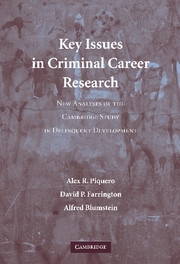 Key Issues in Criminal Career Research
Key Issues in Criminal Career Research Published online by Cambridge University Press: 30 July 2009
The notion of specialization in offending has had a long history in criminology, and researchers have devoted considerable attention to it. Research questions have included: Do some offenders disproportionately commit some particular types of crime, such as violence, during their offending careers? Are patterns of specialization, if they do exist, concentrated in the juvenile years, or do offenders become more specialized at older ages (Cohen, 1986; Piquero et al., 1999). Or is it the case that offenders tend to engage in a diversity of criminal acts, be they violent, nonviolent, and/or drug related and that such diverse patterns of offending continue throughout one's criminal career?
Extant criminological theory also sees the specialization issue as important. For example, some theories, such as Gottfredson and Hirschi's general theory of crime, anticipate very little specialized offending in the career, while other theories, such as Moffitt's developmental taxonomy, hypothesize some level of specialization for one type of offender (i.e., adolescence-limited) but more generalist patterns for another type (i.e., life-course-persister). The issue of specialization is also important for policy reasons (Farrington et al., 1988). For example, if offending were more specialized, then knowledge about earlier types of offenses in one's career would help officials to predict later offense types and help criminal and/or juvenile justice/adult decision-making efforts.
Much research has been brought to bear on the issue of specialization/versatility. Three findings stand out from this line of research.
To save this book to your Kindle, first ensure [email protected] is added to your Approved Personal Document E-mail List under your Personal Document Settings on the Manage Your Content and Devices page of your Amazon account. Then enter the ‘name’ part of your Kindle email address below. Find out more about saving to your Kindle.
Note you can select to save to either the @free.kindle.com or @kindle.com variations. ‘@free.kindle.com’ emails are free but can only be saved to your device when it is connected to wi-fi. ‘@kindle.com’ emails can be delivered even when you are not connected to wi-fi, but note that service fees apply.
Find out more about the Kindle Personal Document Service.
To save content items to your account, please confirm that you agree to abide by our usage policies. If this is the first time you use this feature, you will be asked to authorise Cambridge Core to connect with your account. Find out more about saving content to Dropbox.
To save content items to your account, please confirm that you agree to abide by our usage policies. If this is the first time you use this feature, you will be asked to authorise Cambridge Core to connect with your account. Find out more about saving content to Google Drive.